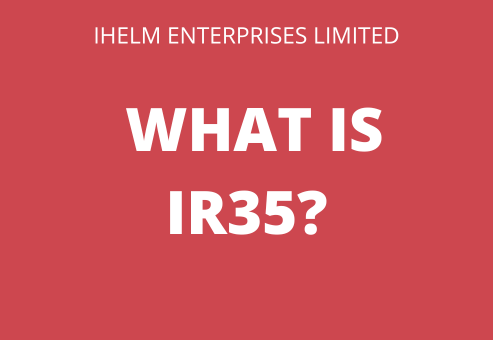During this month’s Facebook Live, I talked about what IR35 is and how it affects workers.
What is IR35?
IR35 is a rule which became law in 2000. It is also known as the off-payroll working rules. IR35 was put in place to stop workers (mostly contractors) from being able to work for a company as an individual when they are really an employee. If someone falls under IR35, they are taxed at the same rates as if they were an employee.
Who does IR35 affect?
IR35 affects all workers, or contractors, who are not self-employed. The workers will usually have their own company – it could be a limited company, partnership or individual – and they work through that company.
Someone could be working through a limited company and not be affected by IR35 – it all depends on the circumstances for each of the clients a business provides services to.
How do I tell if IR35 affects me?
The first thing to establish is whether you are definitely self-employed. HMRC have drawn up several statements to help someone decide if they are self-employed.
In order to be classed as self-employed, most of the following statements need to be true:
- You put in bids or give quotes to get work
- You are not under direct supervision when working
- You submit invoices for the work you’ve done
- You are responsible for paying your own National Insurance and tax
- You do not get holiday or sick pay when you aren’t working
- You have a contract with each client that uses terms like self-employed, consultant or independent contractor
HMRC have an online checking system available that can help someone understand if they would be classed as employed or self-employed. You can find the link to it on this page.
If HMRC are looking into whether you are truly self-employed or if you fall under IR35, they will look at all of the different factors and decide from there. It is very important that any contracts you provide reflect how you work with your clients (ie you will be invoicing them for the work, whether you are being supervised by them, whether you get sick pay/holiday pay).
The next step is to look at the three key indicators that someone falls under IR35 or not.
- Do you as the person providing the service, have the right to provide a replacement worker to carry out the contract if you are unable to do it yourself?
- Is there an obligation on your client to provide you with the work and an obligation for you to carry out that work? This is referred to as Mutuality of Obligations (MOO).
- Are you as the person providing the service in control of how the work is done, where it is done and when it is done? The more factors that show that you as the service provider are the one that is in control, the more it will indicate that you do not fall under IR35.
There are other conditions that are looked at to help determine whether someone falls under IR35 or not and this includes things like who provides the equipment,
What happens if I do fall under IR35?
If after all the checks have been done, it is determined that you fall under IR35 (sometimes referred to as “inside IR35), you will be considered an employee of the client and will be subject to PAYE. You will be required to pay the correct tax amounts for PAYE and National Insurance. You will also have to declare on your tax return that you fall under IR35. There is guidance on the HMRC website about how to calculate the appropriate amount of taxes you need to pay if you are deemed to be under IR35. You can access that page here.
If you are under IR35, the way in which you calculate your income is different. You will not be able to claim all of the expenses a business is allowed to claim, as you are restricted to only being able to claiming a flat rate of 5% for general expenses, and any other expenses that are claimed can only be ones that employees are allowed to claim from their employer. You can read about what those types of expenses are on the HMRC website. You are then allowed to claim capital allowances but only on any equipment that’s been bought that directly relates to the work you are doing and any pension contributions made to an approved pension scheme.
In terms of National Insurance, if you are under IR35, you will be required to pay Class1 and Class1a National Insurance contributions which are directly related to Employer National Insurance. HMRC have further guidance on National Insurance contributions on its website.
As IR35 is quite a complex situation, especially when calculating the correct amount of tax that needs to be paid, I would advise that you have a bookkeeper or an accountant help you with filing your tax return and ensuring that the correct amounts are paid to HMRC.
If you would like further information about IR35, please feel free to e-mail me.

